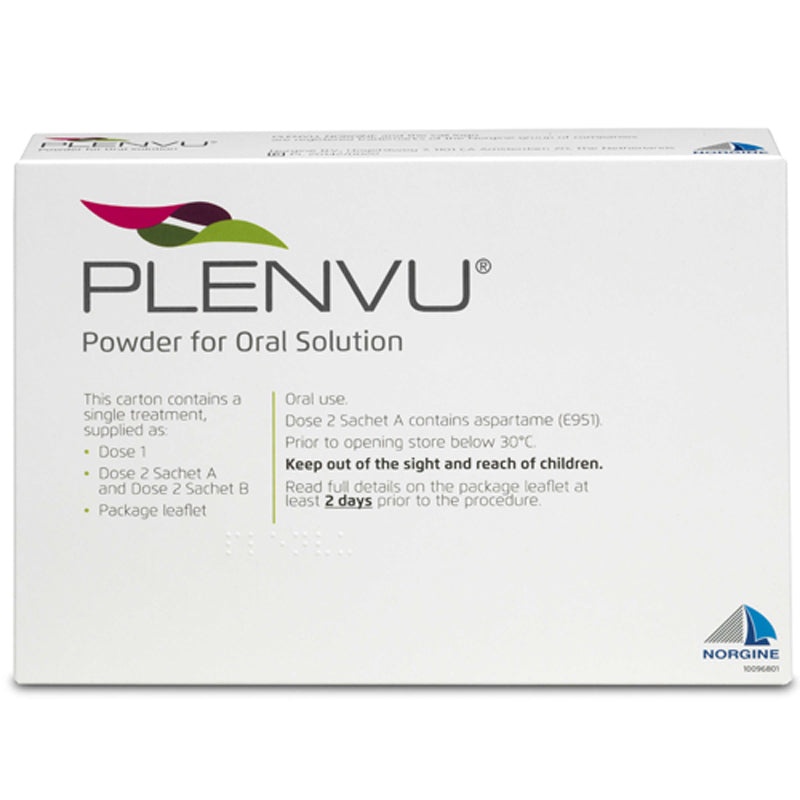

Plenvu

Ask a doctor about a prescription for Plenvu

How to use Plenvu
Leaflet attached to the packaging: patient information
Plenvu, powder for oral solution
Macrogol 3350, sodium ascorbate, anhydrous sodium sulfate, ascorbic acid, sodium chloride, and potassium chloride.
Read the leaflet carefully before taking the medicine, as it contains
important information for the patient.
- Keep this leaflet, so you can read it again if you need to.
- If you have any doubts, consult your doctor, pharmacist, or nurse.
- This medicine has been prescribed specifically for you. Do not pass it on to others. The medicine may harm them, even if their symptoms are the same as yours.
- If the patient experiences any side effects, including any side effects not listed in this leaflet, they should tell their doctor, pharmacist, or nurse. See section 4.
Table of contents of the leaflet
- 1. What is Plenvu and what is it used for
- 2. Important information before taking Plenvu
- 3. How to take Plenvu
- 4. Possible side effects
- 5. How to store Plenvu
- 6. Contents of the pack and other information
1. What is Plenvu and what is it used for
Plenvu contains several active substances: macrogol 3350, sodium ascorbate, anhydrous sodium sulfate, ascorbic acid, sodium chloride, and potassium chloride.
Plenvu is a laxative.
Plenvu is intended for use in adults aged 18 and over before any clinical procedure requiring bowel cleansing.
Plenvu cleanses the bowel by causing diarrhea.
2. Important information before taking Plenvu
When not to take Plenvu:
- in case of bowel obstruction (intestinal obstruction);
- in case of a hole in the wall of the stomach or intestine (intestinal perforation);
- in case of intestinal paralysis (ileus);
Warnings and precautions
Before taking Plenvu, consult your doctor, pharmacist, or nurse in the following cases. If:
- the patient has heart problems or arrhythmias;
- the patient has kidney problems and/or is dehydrated;
- the patient has heart failure, severe kidney problems, or is taking blood pressure medications;
- the patient has stomach or intestinal problems, including inflammatory bowel disease;
- the patient has difficulty swallowing (see also "Taking Plenvu with food and drink");
- the patient has elevated or decreased levels of salts (e.g., sodium, potassium) in the blood;
- there is any other medical condition (e.g., seizure);
- the patient has epilepsy or has had seizures in the past.
Plenvu should not be given to patients with impaired consciousness without medical supervision.
Patients in poor health or with severe illness must pay special attention to possible side effects listed in section 4. In case of doubt, consult your doctor, pharmacist, or nurse.
If during the intake of Plenvu for bowel cleansing, the patient experiences sudden abdominal pain or rectal bleeding, they should contact their doctor or seek medical help immediately.
If during the intake of Plenvu, vomiting (with blood) occurs, followed by sudden chest, neck, or abdominal pain, difficulty swallowing, or difficulty breathing, the patient should stop taking the medicine and contact their doctor immediately.
Children and adolescents
Plenvu is not recommended for children and adolescents under 18 years of age.
Plenvu and other medicines
Tell your doctor, pharmacist, or nurse about all medicines you are taking, have recently taken, or plan to take (including oral contraceptives).
Oral medicines may be flushed out of the gastrointestinal tract and may not be absorbed properly if taken 1 hour before, during, and 1 hour after taking Plenvu.
In the case of oral contraception, it may be necessary to use additional contraceptive methods (e.g., condom) to prevent pregnancy.
Taking Plenvu with food and drink
On the day before the procedure, you can have a light breakfast and a light lunch.
In the case of a split-dose regimen over two daysOR a dose regimen on the day before the procedure, dinner should be finished at least 3 hours before starting to take Plenvu, and then only liquids can be consumed.
In the case of a morning-only dose regimen, you can have a clear soup and/or natural yogurt for dinner (which should be finished before about 8:00 PM). After dinner on the evening before the procedure, only clear liquids can be consumed.
Note: Information on dosing regimens can be found in section 3.
On the day of the procedure, do not eat breakfast.
Continue to drink clearliquids before, during, and after taking Plenvu to protect against fluid loss (dehydration). It is essential to drink additional recommended amounts of clear liquids.
Examples of clear liquids are: water, clear soups, herbal tea, black tea or coffee (without milk), soft drinks/diluted syrups, and clear fruit juices (without pulp).
Important information:
Do not drink alcohol, milk, any red or purple liquids (e.g., currant juice), or other drinks containing pulp.
Do not eat solid foods during the intake of Plenvu and until the procedure is performed.
Stop drinking liquids at least:
- 2 hours before the procedure under general anesthesia or
- 1 hour before the procedure without general anesthesia.
Plenvu may inhibit the action of thickening agents used in cases where fluid thickening is necessary for safe swallowing.
Pregnancy, breastfeeding, and fertility
There is no data on the use of Plenvu during pregnancy or breastfeeding, so it is not recommended. The medicine can only be taken if the doctor considers it necessary. If the patient is pregnant or breastfeeding, suspects she may be pregnant, or plans to have a child, she should consult her doctor or pharmacist before taking Plenvu.
Driving and using machines
Plenvu does not affect the ability to drive or use machines.
Plenvu contains sodium, potassium, and a source of phenylalanine
This medicine contains 458.5 mmol (10.5 g) of sodium per treatment cycle. This should be taken into account for patients controlling their sodium intake.
This medicine contains 29.4 mmol (1.1 g) of potassium per treatment cycle. This should be considered for patients with reduced kidney function and patients controlling their potassium intake.
Plenvu contains a source of phenylalanine. It may be harmful to patients with phenylketonuria.
It also contains ascorbate, which may be harmful to patients with glucose-6-phosphate dehydrogenase deficiency.
3. How to take Plenvu
This medicine should always be taken according to the doctor's or pharmacist's instructions. In case of doubt, consult your doctor, pharmacist, or nurse.
Before taking Plenvu, read the instructions below carefully. Important information:
- When to take Plenvu
- How to prepare Plenvu
- How to drink Plenvu
- What to expect
When to take Plenvu
Treatment with Plenvu should be completed before the clinical procedure.
The treatment cycle can be taken in separate doses as described below:
Split-dose regimen over two days
Dose 1 should be taken on the evening before the clinical procedure, and the second dose in the morning on the day of the procedure, about 12 hours after starting the first dose or
Morning-only dose regimen
Doses 1 and 2 should be taken in the morning on the day of the clinical procedure. The second dose should be taken at least 2 hours after starting the first dose or
Dose regimen on the day before the procedure
Doses 1 and 2 should be taken in the evening on the day before the clinical procedure. The second dose should be taken at least 2 hours after starting the first dose.
Your doctor will provide information on which dosing regimen to use. DO NOT add any other ingredients to the medicine.
Do not eat solid foods during the intake of Plenvu and until the procedure is performed.
Information on meal times before taking Plenvu can be found in section 2.
How to prepare dose 1 of Plenvu
- 1. Open the carton and remove the sachet with dose 1.
- 2. Pour the contents of the sachet with dose 1 into a measuring container with 500 ml of liquid.
- 3. Fill with water to a volume of 500 ml and mix until the powder is completely dissolved. This may take up to 8 minutes.

How to drink dose 1 of Plenvu
Drink 500 ml of dose 1 and 500 ml of clear liquid within 60 minutes. It is acceptable to alternate between the prepared solution and clear liquid. Try to drink a full glass of liquid every 10-15 minutes.
Clear liquid can include water, clear soup, diluted syrups/fruit juices (without pulp), tea, or coffee (without milk).

How to prepare dose 2 of Plenvu
- 1. When the patient is ready to take dose 2, pour the contents of sachets A and B of dose 2 into a measuring container with 500 ml of liquid.
- 2. Fill with water to a volume of 500 ml and mix until the powder is completely dissolved. This may take up to 8 minutes.

How to drink dose 2 of Plenvu
According to the recommended dosing regimen, prepare and drink 500 ml of dose 2 and 500 ml of clear liquid within 60 minutes. It is acceptable to alternate between the prepared solution and clear liquid.

Additional clear liquids can be consumed during the bowel preparation process, i.e., before, during, and after taking Plenvu, but fluid intake should be stopped 1 to 2 hours before the clinical procedure. Drinking clear liquids will protect against fluid loss (dehydration).
What to expect
After starting to drink the Plenvu solution, stay near a toilet. At certain times, watery stools will occur. This is normal and means that the Plenvu solution is working.
Before the first bowel movement, abdominal bloating may occur.
If you follow these instructions, the bowel will be cleansed, which will help the examination to be performed successfully.
Wait for a sufficient amount of time after the bowel movements have stopped before traveling to the clinic/hospital.
Taking a higher dose of laxatives than recommended
If Plenvu is taken before or after taking other laxative products, excessive diarrhea may occur, leading to dehydration. Drink plenty of clear liquid. In case of doubt, consult your doctor or seek immediate medical attention.
Missing a dose of Plenvu
- In case of missing a dose of Plenvu as recommended, take it as soon as possible and consult your doctor, pharmacist, or nurse for advice before undergoing the clinical procedure.
- It is essential to ensure sufficient time for Plenvu to work to cleanse the bowel properly, at least 2 hours before the clinical procedure.
In case of any further doubts about the use of this medicine, consult your doctor, pharmacist, or nurse.
4. Possible side effects
Like all medicines, Plenvu can cause side effects, although not everybody gets them.
The occurrence of diarrhea during the intake of Plenvu is a normal reaction.
If a bowel movement does not occur within 6 hours after taking Plenvu, stop takingthe medicine and contact your doctor immediately.
If you experience any of the following side effects, stop takingPlenvu and immediately inform your doctor, as they may be symptoms of a serious allergic reaction:
- extreme fatigue,
- palpitations,
- rash or itching,
- shortness of breath,
- swelling of the face, ankles, or other parts of the body. Stop taking Plenvu and immediately contact your doctor if you experience any of the following side effects:
- seizures.
Immediately inform your doctor if you experience any of the following symptoms during the intake of Plenvu, as they may indicate overhydration or dehydration:
- dizziness,
- headache,
- less frequent urination than usual,
- vomiting.
Also, immediately inform your doctor if you experience severe abdominal pain (stomach pain).
In rare cases, during the use of laxatives for bowel preparation, especially in patients with underlying heart disease or electrolyte disturbances, serious heart rhythm disorders (i.e., a feeling of strong, pounding, or irregular heartbeat lasting for a few seconds or even minutes) may occur. If such symptoms persist, inform your doctor.
Common side effects (may affect up to 1 in 10 people):
- dehydration,
- nausea (nausea),
- vomiting.
Uncommon side effects (may affect up to 1 in 100 people):
- bloating and abdominal pain,
- discomfort and pain,
- allergic reaction,
- chills,
- fatigue,
- headache or migraine,
- hot flashes,
- increased blood glucose levels in diabetic patients,
- rapid heartbeat,
- palpitations,
- anal pain,
- insomnia,
- transient increased blood pressure,
- transient increased liver enzyme activity,
- feeling of thirst,
- various electrolyte disturbances,
- weakness.
Frequency not known (frequency cannot be estimated from the available data):
- esophageal rupture due to vomiting.
Reporting side effects
If you experience any side effects, including any side effects not listed in this leaflet, tell your doctor, pharmacist, or nurse.
Side effects can be reported directly to the Department of Adverse Reaction Monitoring of Medicinal Products, Medical Devices, and Biocidal Products
Al. Jerozolimskie 181C
02-222 Warsaw
Tel.: +48 22 49 21 301
Fax: +48 22 49 21 309
Website: https://smz.ezdrowie.gov.pl
Side effects can also be reported to the marketing authorization holder.
By reporting side effects, you can help provide more information on the safety of this medicine.
5. How to store Plenvu
Keep the medicine out of the sight and reach of children.
Do not use this medicine after the expiry date stated on the sachet and carton after the words EXP. The expiry date refers to the last day of the month.
Please note that the expiry dates of individual sachets and packaging may differ.
Before opening, do not store above 25°C.
Prepared solutions should be stored below 25°C and consumed within 24 hours.
Solutions can be stored in the refrigerator. Solutions should be stored under cover.
Medicines should not be disposed of via wastewater or household waste. Ask your pharmacist how to dispose of medicines no longer required. This will help protect the environment.
6. Contents of the pack and other information
What Plenvu contains
In the sachet with dose 1are the following active substances:
Macrogol 3350
100 g
Anhydrous sodium sulfate
9 g
Sodium chloride
2 g
Potassium chloride
1 g
The electrolyte concentrations after preparation of 500 ml of the first dose are as follows:
Sodium
160.9 mmol/500 ml
Sulfate
Chloride
Potassium
63.4 mmol/500 ml
47.6 mmol/500 ml
13.3 mmol/500 ml
Dose 1 also contains 0.79 g of sucralose (E955).
In the sachets with dose 2 (sachets A and B)are the following active substances:
Sachet A:
Macrogol 3350
40 g
Sodium chloride
3.2 g
Potassium chloride
1.2 g
Sachet B:
Sodium ascorbate
48.11 g
Ascorbic acid
7.54 g
The electrolyte concentrations after preparation of 500 ml of the second dose (from sachets A and B) are as follows:
Sodium
297.6 mmol/500 ml
Ascorbate
285.7 mmol/500 ml
Chloride
70.9 mmol/500 ml
Potassium
16.1 mmol/500 ml
Excipients with known effects
Dose 2 (sachet A) also contains 0.88 g of aspartame (E951).
Other ingredients:
Mango flavor containing maltodextrin (E1400), glycerin (E422), natural flavoring substances, gum arabic (E414), and flavor preparations.
Fruit flavor containing maltodextrin (E1400), gum arabic (E414), flavoring substances, and flavor preparations.
More information can be found in section 2.
What Plenvu looks like and contents of the pack
The pack contains three sachets: dose 1, sachet A of dose 2, and sachet B of dose 2.
Plenvu, powder for oral solution, is available in packs containing 1 treatment set and packs containing 40, 80, 160, and 320 treatment sets.
Not all pack sizes may be marketed.
Marketing authorization holder:
Norgine B.V.
Antonio Vivaldistraat 150,
1083 HP Amsterdam
Netherlands
Tel: +31 (0)20 567 09 00
Importer:
Norgine B.V.
Antonio Vivaldistraat 150
1083 HP Amsterdam
Netherlands
Norgine Pharma
29 rue Ethe Virton
Dreux 28100
France
This medicine is authorized in the Member States of the European Economic Area and in the United Kingdom (Northern Ireland) under the following names:
Belgium, Bulgaria, Czech Republic, Croatia, Denmark, Finland, France, Germany, Hungary, Iceland, Ireland, Italy, Luxembourg, Norway, Poland, Portugal, Romania, Slovakia, Slovenia, Sweden, United Kingdom (Northern Ireland): PLENVU
Austria, Netherlands, Spain: PLEINVUE
Date of last revision of the leaflet:May 2025
- Country of registration
- Prescription requiredYes
- Manufacturer
- ImporterNorgine B.V.
- This information is for reference only and does not constitute medical advice. Always consult a licensed doctor before taking any medication. Oladoctor is not responsible for medical decisions based on this content.
- Alternatives to PlenvuDosage form: Powder, 13.7 gActive substance: macrogol, combinationsPrescription not requiredDosage form: Powder, -Active substance: macrogol, combinationsManufacturer: Sigma Italia S.p.A.Prescription requiredDosage form: Tablets, 1500 mgActive substance: sodium phosphatePrescription required
Alternatives to Plenvu in other countries
The best alternatives with the same active ingredient and therapeutic effect.
Alternative to Plenvu in Spain
Online doctors for Plenvu
Discuss dosage, side effects, interactions, contraindications, and prescription renewal for Plenvu – subject to medical assessment and local rules.














